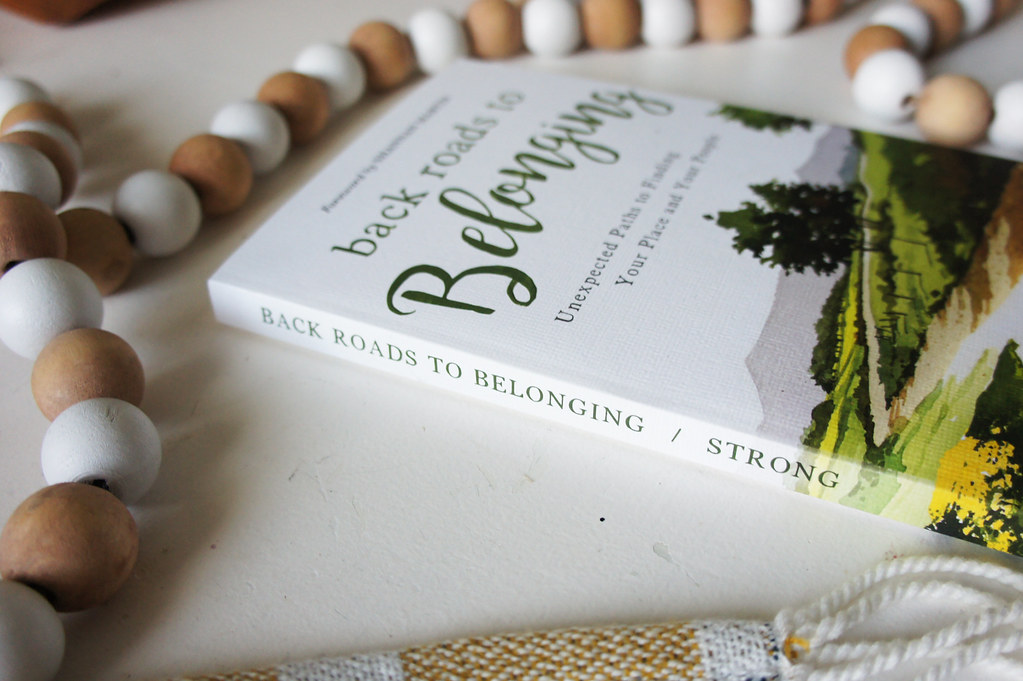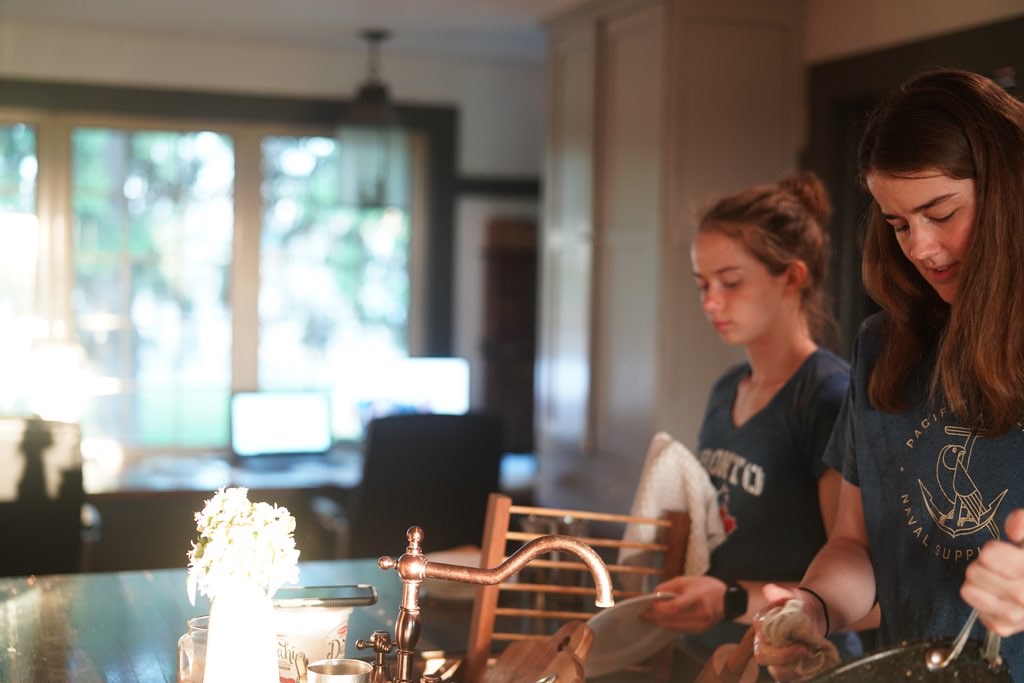Is there any feeling more aching than wondering where we really belong? The struggle to find our place and our people is one Kristen Strong has known many times over her years as a military wife, writer, and mother of three. She also knows that other people’s stories can be traveling companions to our own belonging places as we often find something of ourselves within them. She’s captured many stories and much wisdom in her book Back Roads to Belonging: Unexpected Paths to Finding Your Place and Your People. It’s a grace to welcome Kristen to the farm’s front porch today…
I remember that rainy February day when my good friend, the one with much older kids, swung by for a visit when the house looked like we’d been livin’ large and cleanin’ little.
And if you defined “livin’ large” as surviving a houseful of sick little people, then living large was what we had been doing.
Answering the doorbell, I shrugged off the state of the house, knowing my friend was no stranger to this stage of life.
As I walked toward the door, I looked down at my baby girl asleep in my arms, body warm and worn out from a persistent virus.
I opened the door with one hand and quietly welcomed my friend inside. We moved to the sofa and I cleared off the boys’ collection of dinosaurs so we could sit. We chatted quietly for five minutes or so until James and Ethan, finally fever-free, ran hollering into the room.
I made my most desperate mom face and shushed them something fierce, pointing to their sleeping sister. The baby woke, and I sighed, exasperated.
Swaying with my baby in my arms, I risked a see-through heart and confessed, “You know, some days with little ones are just so hard.” I smoothed hair out of my daughter’s eyes, blind to my friend’s forthcoming response.
“Well, you’re the one who decided to have kids. What did you expect?”
I stared at her as her words ricocheted off the walls and hit my heart. That’ll teach me to be vulnerable, I said to myself.
My mouth shut, and the walls of my heart thickened, because that’s what happens when you get a little too real with unsafe people.
Instead of giving you understanding and support, they give you the bricks and cement to fashion a false exterior that looks like I’m fine! and Everything’s great! and Nope, I don’t need any help at all.
I held my sick baby girl close to my hurting heart. My friend left but her words lingered, and I was left wondering what to do with them.








Joy Prouty


Thinking back on that encounter, close to fifteen years later, I want to wrap my arms around my younger self and say, The only thing to do is to toss her words away and know they do not belong near you. The only thing to do is know that, at least when it comes to sharing parenting struggles, this woman does not belong in your confidence. On that front, you don’t belong with her.
As important as it is for us to know where we do belong, it’s important for us to know where we do not.
There are simply some places not meant for us.
If a particular relationship continually hands us more sabotage than support, then let’s look ourselves square in our beautiful eyes and tell ourselves: “You don’t belong there.”
This doesn’t mean we only surround ourselves with people who live and think just like us. No one will agree with us on everything, and we need to have people in our lives who can lovingly set us straight with painful truth.
In the end, those words—hard to hear though they may be—are for us. They move us closer to reflecting the character of Jesus.
Motive is what makes all the difference.
We might get a little off-track and need someone to kindly help us find our way on the right road again. But no one should run us off it into the ditch.
A long time ago, the Lord gave me a visual of this, an image of our hearts reflecting the Old Testament tabernacle. It represented God’s house, the tented palace where he dwelled in the midst of the Israelites.
The tabernacle consisted of three primary areas: the outer courtyard, the Holy Place, and the inner Holy of Holies. God was enthroned on what was known as the Ark of the Covenant in the Holy of Holies, also called the Most Holy Place.
Only the high priest could enter into the Holy of Holies. The farther within the tabernacle one moved, the more restricted the access became.
Here’s the parallel: in our hearts, the entrance, or outer courtyard, is the place where many can come.
Other parts are more holy places where people who are for us may cross the threshold.
And just as the Holy of Holies was just for the high priest and the Lord, there may be parts of your story, past and present, best shared with God alone.
As the One who knows you better than any person on earth, He will be the only one who speaks to you from a place of flawless for-you truth.
He will always advise you with your best in mind, even if that means suggesting boundaries around you so others can’t get the access to you they want.
And just as we need to be careful of whom we allow access to our heart, we need to be careful to not take it personally when others don’t allow us access to theirs.
Likely it’s not because we’ve been careless with their heart. (If we have, Lord, forgive us, and may we consider whether or not we need to apologize to that person as well.) Instead, it’s likely because they have limited bandwidth and must tend to who and what the Lord directs is most important.
We may look toward another who is inside someone else’s inner place and think, It should be me, not her.
When you boil it down, God has called the other person there, not you and not me, and it’s His best for us to be elsewhere.
We can be happy for how God is working in her life while simultaneously being assured He’s working the same way in ours.
As we struggle to hang on to hope for finding where we belong, we can absolutely believe that God hasn’t saved His worst for us.
We can trust Him to place us with those who will feed, honor, love, and serve us best as we reciprocate those actions to others.
If you are on the outside somewhere, God is simultaneously calling you on the inside somewhere else.
Remember, there’s always room at the table God picks out for you.
And so perhaps it’s time we committed to not spending large amounts of time bemoaning why we’re not at another table.
Perhaps it’s time we refuse to feel guilty for having a boundary so those who wound us remain on the other side of our heart’s rooms.
If we’re going to hide, may it be in the all-compassionate, ever-faithful Jesus Christ—our completely safe place.
“There is now no condemnation for those who are in Christ Jesus” (Romans 8:1 NIV).
Kristen Strong, author of Girl Meets Change, writes as a friend offering meaningful encouragement for each season of life so you can see it with more hope and less worry. She and her US Air Force veteran husband, David, have three children. Together this military family zigzagged across the country (and one ocean) several times before settling in Colorado Springs, Colorado.
Kristen knows better than most that at one time or another, shifting seasons in family, friendships, employment, and communities will bring each of us face-to-face with the feeling of being on the outside looking in. Because we are made for connection, this will often lead us down one of two roads. Either we will hop on the popular but crowded highway that asks us to do whatever it takes to get noticed, or we’ll stand still, paralyzed by the fear that we’re not important, loveable, or worth other people’s time and attention.
In her new book Back Roads to Belonging: Unexpected Paths to Finding Your Place and Your People, Kristen walks beside you along the less traveled but more satisfying third way—the back road way—to belonging: remaining in Christ and relaxing into the unique role God has for you.
[ Our humble thanks to Baker for their partnership in today’s devotion ]








